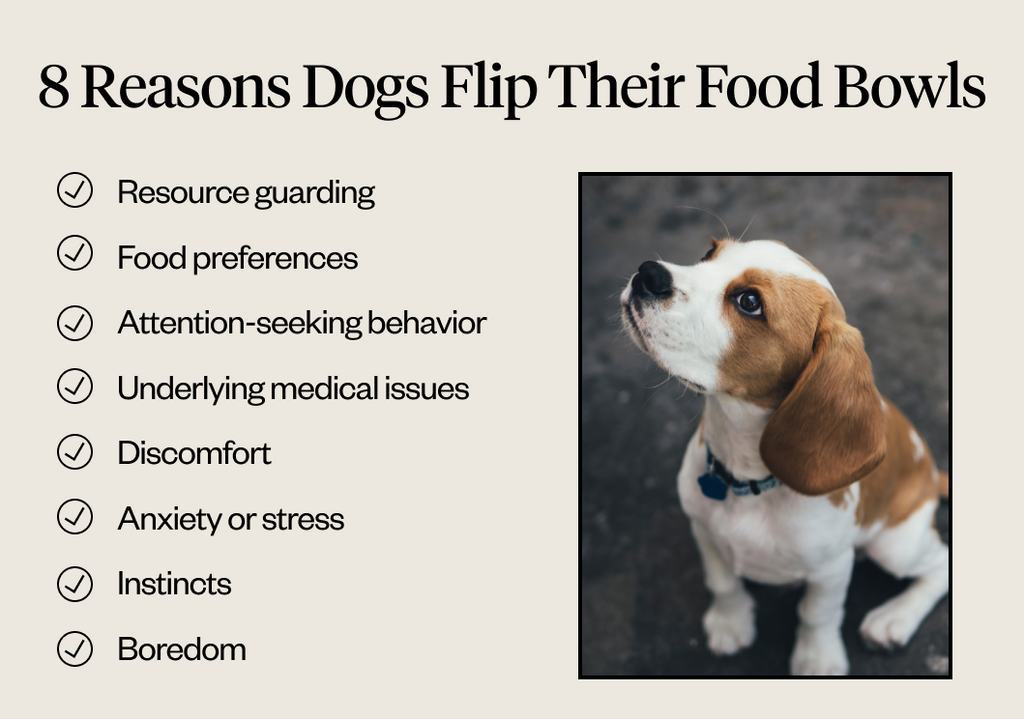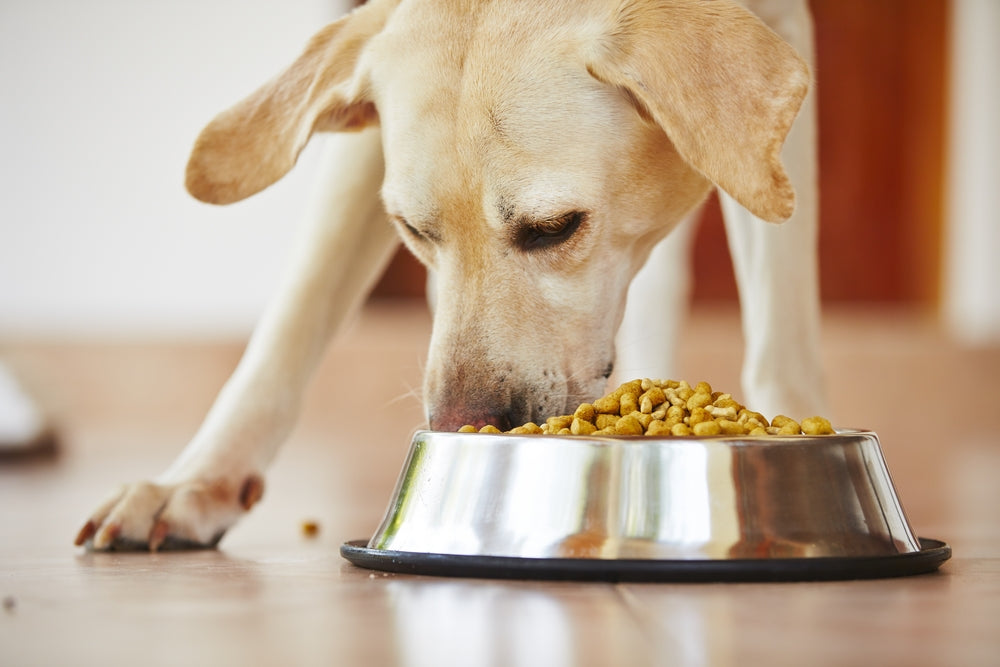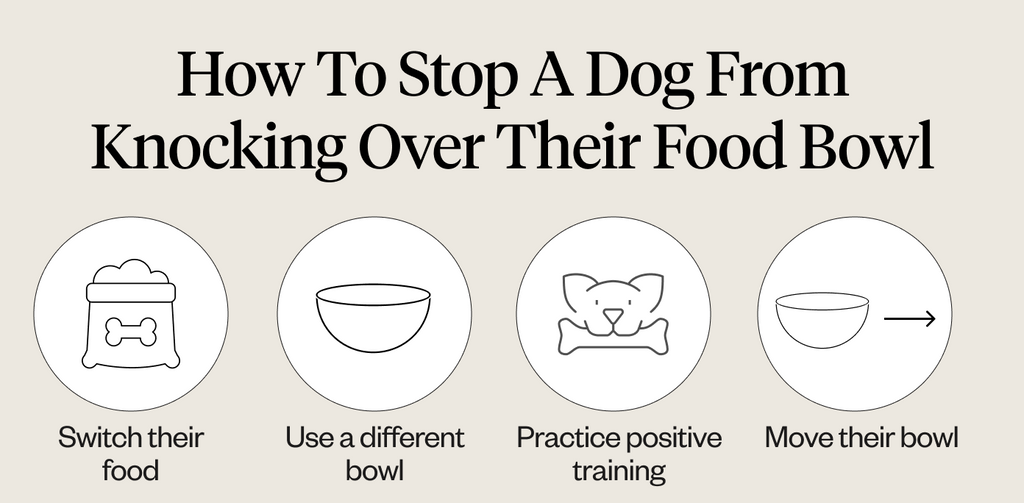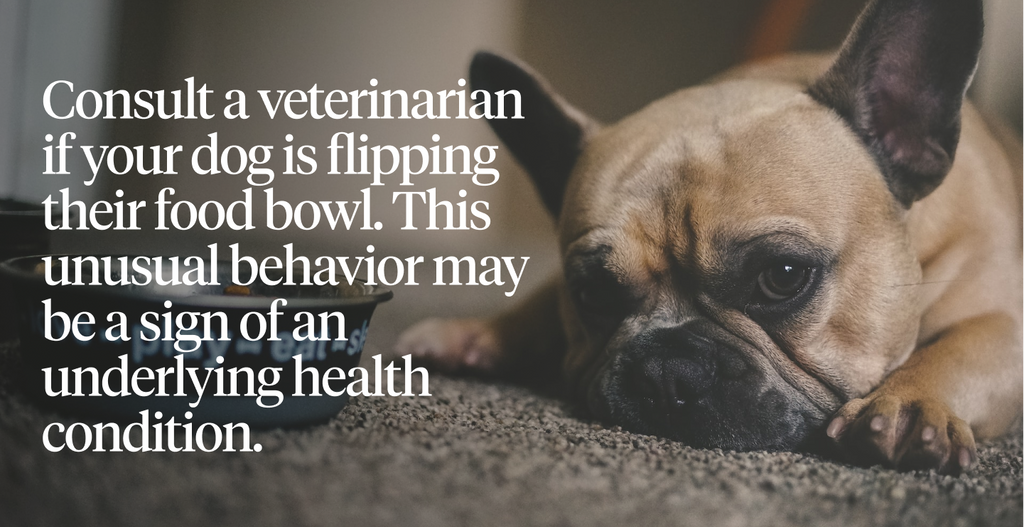10 Min Read
Why Does My Dog Flip Their Food Bowl?
Key takeaway

Why pet owners are switching to online vet care with Dutch
-
Prescriptions delivered free to you
-
Fast access to Licensed Vets over video
-
Unlimited video visits and follow-ups
Dogs have heightened senses, allowing them to easily and quickly recognize potential “predators.” Your dog might flip their food bowl in an attempt to protect their food from these perceived predators or dangers, especially if you own more than one pet.
Your dog's ancestors were always alert when eating, ready to fight to keep their food if necessary. While today’s pet dogs don’t need to worry about that anymore, the instinct to protect their food is probably still present in your dog’s evolutionary behavior.¹ The same idea applies to other behaviors, such as digging or stalking certain prey animals.
Your dog may also be anxious or uncomfortable about their food bowl's sound, feel, taste, or look, especially if it's made of metal.² Like humans, some dogs don’t like certain materials. Your dog might flip the food out of the bowl and eat it off the ground.
In this post, we’ll discuss why your dog may be flipping their food bowl and the best strategies to reduce this behavior. It’s also never a bad idea to seek advice from a veterinarian if you're concerned about your dog’s behavior.
- Reasons Dogs Flip Their Food Bowls
- How To Stop A Dog From Knocking Over Their Food Bowl
- Should You Consult A Vet If Your Dog Is Tipping Their Food Bowl?⁴
- Final Notes

Reasons Dogs Flip Their Food Bowls
Why do dogs flip their food bowls? There are a few reasons why your dog may be flipping their food bowl. These can include food preferences, wanting attention, underlying medical issues, anxiety and stress, or boredom.
Try to determine what's causing your dog to react negatively to their food bowl. Is it the material of the bowl? Has something changed in the food’s flavor? Is your dog experiencing anxiety, discomfort, or stress? These are all possible reasons why your dog might flip their bowl.
1. Food preferences
It could be that your dog simply doesn’t like their food. Kibble is the standard food option, but your dog might prefer a more flavorful diet.3 If you notice that your dog seems to have an aversion to kibble, consult with a vet to find out what may be the problem. Sometimes, manufacturers slightly change the flavor of dog food. Your dog might be picking up on this, and flipping their bowl is their way of letting you know that the food seems off.
2. Attention seeking
Sometimes, flipping the food bowl is your dog’s way of seeking attention. If your dog is overly needy, they might need further training. Otherwise, it could be that they’re experiencing anxiety and need extra love. Either way, flipping their food bowl could be their way of getting your attention or asking for more food.
3. Underlying medical issues
A less likely reason could be an indication of underlying medical issues. If you have tried cleaning or changing the bowl, varying your dog’s food, or training your dog, it might be time to consult a vet. A tooth infection, loss of appetite, or stomach ache could all be medical reasons for this behavior, especially if your dog has never done it before. Seek advice from a licensed veterinarian.
4. Discomfort
Flipping the food bowl could be your dog's way of telling you they’re experiencing discomfort. This is more likely to be the case if your dog has started doing this out of the blue.
Stomach pain can disrupt your dog’s regular appetite and eating schedule, so they might flip their bowl out of eagerness when they feel hungry. Tooth or gum pain can make it uncomfortable to chew kibble; turning over their food bowl can be an attempt to communicate this to you. Puppies may do this when they’re teething to relieve their pain. Ensure you provide your puppy with plenty of chew toys to help ease the teething process.
5. Anxiety or stress
Anxiety can significantly influence your dog’s behavior in several ways. Changes in the household, including a new pet, a new baby, divorce, or a move, may disturb your pup to the point where they experience anxiety symptoms.

Moving to a new home can be greatly distressing for your dog since this environment is unfamiliar. They need time to adjust and get the lay of the land. Flipping their food bowl might be a way of showing distress. Even something as simple as a new piece of furniture or rearranging the furniture in a room can make your dog anxious.
If something in the environment has changed, it’s a good idea to be extra patient with your furry friend until they feel more at ease. It could be that they feel the need to “escape” something. If your dog feels cornered in some way (perhaps their food bowl has been moved), they might flip their bowl over to escape the situation.
7. Instincts
Instinct drives dogs more than humans, which is why some behaviors, such as digging and chasing, can be seen in almost all dogs. Your dog might be trying to bury their food, just like wild dogs and wolves tend to do. This is an instinctual behavior where the dog will take their food somewhere, dig a hole to hide it, and then return and eat it later. Provide your dog with a designated digging spot to help reduce this behavior during meal times.
Your dog may also guard their food to protect it from potential “predators.” This is especially common in households with multiple dogs or pets. The underlying goal is to hide food or precious items, like toys so that other animals don’t steal or destroy them.
8. Boredom
Dogs might flip their food bowl out of frustration or boredom. They need plenty of mental stimulation to be content. If they're not receiving enough stimulation, they might resort to this type of behavior as a way to alleviate a bored mind.
Giving your bored dog food through a more stimulating method, like a snuffle mat or slow feeder, can be a good idea. Doing so may make meals fun and engaging. Dogs also tend to eat quickly, so eating might be less enjoyable after some time. See if enrichment toys reduce your dog’s bowl-flipping behavior.

How To Stop A Dog From Knocking Over Their Food Bowl
There are many reasons why your dog may flip their food bowl, and numerous methods exist to stop this behavior. Fortunately, most of the reasons your furry companion might be flipping their bowl are relatively easy to fix. Try to remain patient while you get to the root of the problem. Your dog is trying to communicate with you.
Switch their dog food
If your dog has suddenly started flipping their food, it could be their way of telling you something is wrong or they're bored. Dog food manufacturers make mistakes in production or might have changed the taste of the food slightly. Nevertheless, your dog’s keen sense of smell and taste will likely pick up on any changes to the food.
Check to see if there's anything wrong with the food you're currently feeding your dog. Otherwise, try switching the food to a different brand or flavor to make it interesting to your dog again. You can also try varying their treats by introducing different flavors or textures. As a dog owner, speak with a vet to see if a change in diet or food brand would help your dog.
Use a different bowl
If you notice that your dog constantly flips their food bowl but still enjoys eating their actual food, it may be a problem with the bowl itself. In this case, changing the type of bowl can be good.³
Some dogs have sensitive whiskers that brush uncomfortably against the sides of certain materials, like metal or plastic. Other times, the bowl moves around too much and your dog gets frustrated. You can add a non-slip mat under the bowl or switch to a non-slip bowl.
Sometimes the bowl might develop a smell that's unpleasant to your dog. Always wash the food bowl thoroughly after each meal to prevent bad odors or bacteria. However, if washing isn’t the problem, your dog might want a different or new bowl. Another thing to ensure is to properly rinse the bowl because it could be that your dog is reacting to soap residue or scent.
If you have a multi-pet household, it’s best to always feed each pet from separate bowls, rather than a communal one. This can help reduce problems around feeding time, such as resource guarding and aggression. Of course, if your pets are comfortable with each other, they can eat in the same general area. However, if your dog is territorial about their food, you should try and provide them with a safe space for meals.
Practice positive training
Positive reinforcement training can be hugely beneficial to your dog. It motivates them to do the behaviors you want them to do while learning which behaviors are unacceptable. Most dogs are highly food-motivated, so keep treats or pieces of kibble on hand when training your pup.
You can mix up your dog’s feeding routine by changing their feeding location or creating a food treasure hunt to provide mental stimulation. This can be a great way to reinforce and train your dog to associate their food and feeding times with something positive.
Move their bowl
Your dog might feel vulnerable in their current feeding location, causing them to flip their bowl to protect their food. Try changing where you feed your dog and see if that reduces the behavior. A quiet, non-carpeted corner that still has access to you and the rest of your home is ideal.
Should You Consult A Vet If Your Dog Is Tipping Their Food Bowl?
Usually, bowl flipping means that your furry friend doesn’t like their bowl. Whether it’s the texture, sound, feel, smell, or movement of the bowl, something about it is bothering them.
However, in some cases, this behavior is your dog’s way of telling you they’re not feeling well. If they continue doing it even after you’ve changed the bowl it may be time to consult your vet.

The vet will be able to determine if your dog has a dental problem or underlying health condition. It’s always best to consult a vet if your dog exhibits unusual behaviors.
Final Notes
So why does your dog knock over their food bowl? Dogs can flip their food bowl for any number of reasons. Usually, this means they don’t like some aspect of the bowl or food. The food could be the issue, especially if the manufacturer has changed the recipe. Sometimes, this type of behavior can indicate an underlying medical issue or general physical discomfort.
If your dog is flipping their food bowl, you can use Dutch to connect with a licensed vet and receive free advice. Our vets have the experience and expertise to help guide you in keeping your dog happy and healthy. Go online and get in touch today.
Share
References
-
Kearl, Mary. “Why Is My Dog a Picky Eater?” American Kennel Club, American Kennel Club, 1 June 2021, https://www.akc.org/expert-advice/nutrition/why-is-my-dog-a-picky-eater/.
